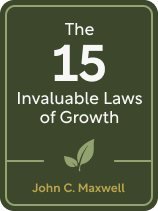

This article is an excerpt from the Shortform book guide to "The 15 Invaluable Laws of Growth" by John C. Maxwell. Shortform has the world's best summaries and analyses of books you should be reading.
Like this article? Sign up for a free trial here.
What’s the arrival fallacy? Do you have a mentor? What are you learning right now?
No matter how successful you become, it’s vital to never stop growing—which requires a lifelong commitment to learning from your experiences. John C. Maxwell explains why continual learning optimizes growth, and he shares strategies to maximize learning and growth throughout your life.
Continue reading to discover how to keep learning, keep growing, and become the person you dream of being.
Keep Learning, Keep Growing
Ideally, throughout your entire life, you’ll continue to approach each new challenge and experience as a learning opportunity—gaining new tools, skills, and insights along the way. Maxwell discusses why you should—and how you can—keep learning, keep growing, and ultimately find true success.
(Shortform note: Maxwell focuses on how lifelong learning supports you in achieving your goals, but experts note that it has a number of other benefits. It can improve your cognitive health by strengthening your brain, which guards against dementia. It can also bolster your social life, as formal classes and other kinds of communal learning bring learners together. Lastly, it can support your self-esteem: People who continue to learn throughout their lives feel more confident in themselves, especially when they can put their knowledge to good use.)
Why Continual Learning Optimizes Growth
Maxwell says that learning contributes to growth in two ways: Learning from the past helps you achieve future success and helps you feel more fulfilled in life.
Learning From the Past Contributes to Future Success
Maxwell argues that you’ll be more successful if you learn from past failures and successes. If you internalize the lessons you learn from the challenges you’ve faced, you can apply them when you take your next steps forward—so instead of making the same old mistakes, you’ll be better prepared to do things right. As a result, you’ll be more likely to achieve each of your goals and, in the long run, realize your potential.
(Shortform note: One interesting way that learning from experience can contribute to your success is that it can improve your chances of being hired. Companies are showing increasing interest in candidates who demonstrate “grit” in their personal lives—the ability to persevere through difficult life circumstances and work hard to accomplish what needs to be done. Often, this asset comes from experiences such as unpaid care work, military service, travel, and so on.)
Learning Increases Your Sense of Fulfillment
Maxwell also argues that since it increases your chances of success, learning also maximizes your overall life satisfaction. If you continue to learn and grow for the rest of your life, you’ll set, and reach, increasingly loftier goals, which will help you feel like you’re making the most of your life. According to Maxwell, giving up on learning and the growth that comes with it means settling for a mediocre life.
(Shortform note: In his encouragement to never stop learning and growing, Maxwell is cautioning against “the arrival fallacy:” the erroneous idea that once you achieve success—in this case, your potential as you envision it now—you’ll feel satisfied for good. While reaching goals can be fulfilling, they don’t create happiness forever. Researchers agree that happiness is more tightly linked to simply enjoying life in the moment. Committing to learning throughout your life means you’ll continue discovering things you enjoy—helping you maintain happiness, regardless of goal achievement.)
How to Become a Lifelong Learner
Now that you understand how lifelong learning can help you reach your potential, how exactly should you approach learning in the context of growth? Maxwell has a few recommendations:
Method #1: Practice Curiosity
Maxwell argues that curiosity enables you to learn valuable information and opens you up to innovative ways of thinking. He offers several strategies for practicing curiosity:
1) Always ask, “Why?” Practically, this means you should be open to, aware of, and inquisitive about the world around you. Viewing every experience you have as a learning opportunity will help you amass a wealth of knowledge over time.
(Shortform note: Asking why can help you figure out the root cause of problems—which means that you can address the actual issues causing the problem, not just the most evident symptoms of the problem. It’s like retracing your steps: If you can figure out how you got to Point Z from Point A, you’ll know exactly how to avoid arriving at Point Z again. It’s important to note that you can use this process to identify the root of success as well—figuring out the precise tactics that helped you so that you can emulate them and replicate your success.)
2) Seek out opportunities that are new and unusual to you and be open to diverse perspectives. If you’re open-minded and innovative, you’ll maximize your chances of success because you’ll be able to overcome barriers that would otherwise hold you back. For example, say your goal is to learn Chinese but you can’t afford to take traditional classes. If you come up with a creative solution, like finding free lessons on Youtube, you’ll still be able to achieve that goal.
(Shortform note: To improve your open-mindedness, consciously practice intellectual humility and welcome challenges to your beliefs. It’s important to recognize that no matter how much you know about a topic, it’s likely that you don’t know everything—you always have opportunities to learn more. Also, keep in mind that nobody’s life experience is universal, so there’s something to learn from everyone you meet. When someone challenges your beliefs, make an effort to listen to their perspective and consider the possibility that you could be wrong.)
Method #2: Choose Good Mentors
Good mentors can teach you what you need to know to succeed in your personal and professional life. According to Maxwell, you should choose mentors who have good, strong character, who have experience in what you’re trying to achieve, and who are willing and able to spend time working with you.
(Shortform note: When you’re looking for a mentor, first consider people you’re already in community with—the better your mentor knows you and your circumstances, the more personalized and helpful their advice will be. If you can’t find a mentor you already know, it’s okay to reach out to people you admire and ask them to meet with you. In these meetings, demonstrate that you’re someone worth mentoring: Be respectful of their time, expertise, and boundaries, and show them that you’re truly interested in learning from them.)
Method #3: Reflect
Maxwell argues that you should take time regularly to reflect on your successes and failures. This helps you extract lessons from these experiences, which you can then apply to future opportunities.
To reflect, first write down questions that prompt you to think about challenges you’ve faced, rewarding experiences, opportunities for improvement, and what gives your life meaning. Then, write your responses to these questions. Finally, take time to think deeply about your responses, paying special attention to challenges that were painful for you. Pain is an excellent teacher—since humans are naturally averse to pain, you won’t be inclined to repeat decisions that have hurt you before.
In pinpointing your painful experiences, make an effort to reframe them as valuable life lessons: This will give you the necessary perspective to learn from your mistakes and implement any necessary changes.
(Shortform note: Reflection helps you overcome adversity because it gives you an opportunity to make sense of what happened, deal with negative emotions, and figure out how to grow from your experiences. In other words, going through the process of reflection can help you slow down, think about a situation clearly, and respond to a painful experience rationally rather than emotionally. It’s best to write your reflections down—studies show that reflective writing helps you think more clearly about situations and doesn’t lend itself to rumination or overthinking the way mental reflection might.)

———End of Preview———
Like what you just read? Read the rest of the world's best book summary and analysis of John C. Maxwell's "The 15 Invaluable Laws of Growth" at Shortform.
Here's what you'll find in our full The 15 Invaluable Laws of Growth summary:
- Why personal growth is essential to living a meaningful life
- How to build strong character and live with integrity
- How to envision, commit to, and pursue meaningful goals






